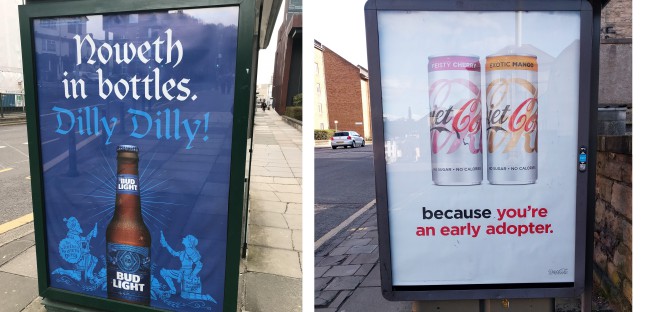Latest posts
A masterclass in creating value
What’s going on at parkrun?
Virtue-signalling all the way to the bank
Bud Light: brand purpose or virtue-signalling?
The Coddling of the American Mind, by Greg Lukianoff and Jonathan Haidt
Belonging, by Owen Eastwood
Such a simple thing
The Long Win, and The Scout Mindset
The Cult of We by Eliot Brown and Maureen Farrell
Coffee and covid modelling
By theme
Marketing strategy
Insight & metrics
Innovation & inspiration
Brand & positioning
Marketing communications
Business purpose
Leadership
By industry sector
Financial services
Retail
FMCG
Technology & start-ups
Consumer services
Business to business
Other sectors
By type
Books
Comment
Quotes
Thought leadership
Bud Light’s Dilly Dilly campaign is a useful reminder that Britain and America are divided by a common language. Apparently it’s a big hit in the USA, where the medieval background to the ads connotes Game of Thrones and is therefore, presumably, quite cool. Whereas here in the UK, any self-respecting beer-drinker who shouts “Dilly dilly!” in a bar can expect a lifetime of mockery.
Coca Cola is another global brand that’s traditionally been loved for its upbeat American values. So it feels like something has gone a bit wrong when you see new flavours with names like Feisty Cherry, whatever that is, advertised with the strapline, “For the early adopter”.
These are examples of what I call “self-conscious marketing”. Instead of offering to meet a need, the brand invites us to observe its marketing idea. It’s like when an actor turns to the audience and speaks directly to them. It grabs your attention, but it also breaks the spell. Dilly Dilly promises nothing other than harmless fun, and wants us all to join in. It’s reported that millions of Americans have done so. Coca Cola’s invitation to be an early adopter suggests these new flavours are far from mainstream and only a progressive few will try them. Hardly encouraging, unless being first really matters to you.
Self-conscious marketing is a useful test to check whether the brand idea has drifted too far from the product it represents. Occasionally that can make sense: familiar brands with a long history may need to do something radical in order to generate reappraisal. Those are the brands with the sort of budget that makes it possible. Sheer repetition can make something seem like a good idea. But it’s risky because it makes the advertising campaign more important than the brand proposition. Skincare brand Dove just about held it together with its Campaign for Real Beauty. For Bud Light and Coca Cola, the connection is less clear.
Businesses with smaller budgets and simpler ideas shouldn’t be rattled by these off-the-wall campaigns. Marketing isn’t complicated. Advertising, the voice of marketing, doesn’t have to be so darn twisted. For most businesses, and brands, it’s enough to be clear what benefit is on offer, who will value that, and why. This means starting not with some crazy advertising idea or an ambitious brand purpose but with the customer. Emotional benefits, like Coke’s “you’re an early adopter” are not usually a good substitute for a clear, relevant functional benefit. That’s especially true for less well-known brands and categories. Customer understanding, leading to a clear proposition, which is delivered by the product experience, is a more lasting route to success than zany advertising.
Latest posts
A masterclass in creating value
What’s going on at parkrun?
Virtue-signalling all the way to the bank
Bud Light: brand purpose or virtue-signalling?
The Coddling of the American Mind, by Greg Lukianoff and Jonathan Haidt
Belonging, by Owen Eastwood
Such a simple thing
The Long Win, and The Scout Mindset
The Cult of We by Eliot Brown and Maureen Farrell
Coffee and covid modelling
By theme
Marketing strategy
Insight & metrics
Innovation & inspiration
Brand & positioning
Marketing communications
Business purpose
Leadership
By industry sector
Financial services
Retail
FMCG
Technology & start-ups
Consumer services
Business to business
Other sectors
By type
Books
Comment
Quotes
Thought leadership
